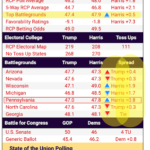
Lawmakers in Congress have pledged to take vigorous action on legislation to counter China after the recess, but if reports are correct, a lot is missing.
Congress finally returns to session next week after a long summer recess. In the House of Representatives, Republican leaders It is said that “Planning a week focused on curbing what they see as an existential threat from China,” lawmakers are “preparing several pieces of legislation for consideration” designed to help the U.S. compete with China.
On the surface, this all sounds great. There is growing recognition in Washington that more needs to be done to address China’s many bad practices. The time to act is now.
But the problem is, a lot Much of the legislation currently before Congress centers on China policy: Confronting China is very popular politically right now, and many lawmakers want to demonstrate their sincerity toward China, especially ahead of the November election.
That means leadership has a lot of options when it comes to crafting China-focused legislation — some bills are relatively symbolic, others are more powerful — and, at least for now, the House doesn’t appear to be willing to act on what could be the most significant piece of China-focused legislation.
As of September 5, the House of Representatives: Finally, the “de minimis” loophole is fixed The bill allows companies like SHEIN and Temu to exploit U.S. trade laws and send goods to the U.S. duty-free. The House also does not appear to be planning to vote on a foreign investment bill that aims to restrict U.S. companies and individuals from investing in sensitive Chinese sectors. Level the Playing Field 2.0and a bill to modernize trade tools needed to combat China’s trade abuses. Reauthorizing Trade Adjustment AssistanceProvide assistance and retraining to workers displaced by trade.
Politico Morning Transportation For more details:
“Everyone is disappointed with the level of ambition in this package of legislation,” a House aide close to the discussions, who spoke on condition of anonymity to candidly discuss the China Week update, told Morning Trade, referring to the small number of bills the Speaker plans to put to a vote. The aide added that votes on those bills may have to wait until after the November election due to disagreements over de minimis and foreign investment.
“We have a package of legislation that removes some of the most important elements of U.S.-China competition policy, including but not limited to minimal foreign investment review and investment and research and development to compete successfully with China,” they said.
This isn’t the only thing Politico has to say on the matter. China Watch Newsletter Report House Republicans are preparing about a dozen China-focused bills, but they “represent just a fraction of the China-related bills proposed this Congress.” A person familiar with China Week planning told Politico that House Speaker Mike Johnson (R-Louisiana) chose the bills with the goal of “avoiding the Republican caucus from seeing us as overly restrictive.”
The newsletter continued:
The sensitivity reflects the House majority’s desire to balance tougher regulations limiting capital flows into China with “a reliance on Wall Street donors for the next election,” Politico said, speaking on condition of anonymity because the person was not authorized to speak publicly about congressional activity.
Scott Paul, president of the Federation of American Manufacturing Discussed about X (Old Twitter) “China Week” will end up being a weak one after House leadership’s decision to remove the most impactful bills from the agenda.
“Harsh trade and investment measures are on hold. Global corporations have successfully persuaded House Republicans to back off,” Paul wrote. “Not a good signal to send to Beijing.”




